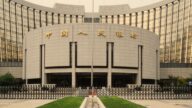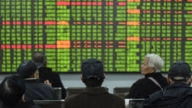【新唐人2014年03月12日訊】在2014剛過去的兩個月裡,中國的出口急速減少、房地產成交量和價格雙雙下降。外界認為,拉動中國經濟的三駕馬車中,兩架已經趴下,而作為驅動經濟引擎的「投資」則成本過高。今年7.5%的國內生產總值GDP增長目標,只是一個美麗的謊言。
海關總署3月8號公布的數據顯示,中國2月出口6965億2000萬元,下降20.4%﹔進口8363億1000萬元,增長7%﹔當月實現貿易逆差1397億9000萬元。
另外,3月10號,人民幣對美元中間價大幅低開,人民幣即期早盤劇烈波動,盤中跌了將近300個基點,最大跌幅超過0.5% 。降幅達到2012年7月以來的最高水平。
外界普遍認為,是央行在有意壓低人民幣匯率,來拉動出口。
《央視》財經評論員牛刀:「但是這個東西不是它調的,這是國際市場促成的,這是一個原因。另外一個原因實際上是美元出逃中國,造成人民幣貶值,因為好多人賣了房子要換成美元出逃,其他的銀行拿不出美元來,就買美元。向央行買美元,就造成了人民幣的貶值,中央銀行,前面那段時間大貶的時候,還是掏空美元去打壓美元的,它是維護人民幣升值的,我們在市場上看得清清楚楚。」
3月9號,中共國家統計局公布,2月份,代表消費價格指數的CPI環比上漲0.5%,同比上漲2.0%,而代表工業生產者出廠價格指數的PPI環比下降了0.2%,同比下降2.0% ,PPI已經連續幾年下跌。
大陸經濟分析師任中道:「現在是天量的貨幣供應量,因此對國內始終是貶值,它物價始終在上漲,其實是成本在上漲,PPI的工業指數應該和CPI是並行的,它兩者一直是背離,實際上是物價始終在上漲,老百姓要承受嚴重的通貨膨脹所帶來的資產的損失。」
從資金面看,7天質押回購,國債逆回購,利率都連續下滑了近20天,《央視》財經評論員「牛刀」指出,如此寬鬆的資金面,商品價格本應上漲,但商品價格自去年12月起就開始連續下跌。這些表明,中國濫發貨幣已經走到盡頭,下游需求嚴重不足。
另外,央行10號公布的金融數據顯示,1、2月新增存款較去年同期大幅減少8339億元。而同期的房屋成交量也下降50%以上。
牛刀:「老百姓沒甚麼錢,有錢的是一部分的富人,靠一部分富人怎麼可能把一個國家的經濟拉動呢?這不是荒唐的事嗎? 大量的人沒錢消費,剛剛有一點錢消費的人,都被房子壓死了。共產黨是發瘋了,天天在土地上搖錢,那土地的錢就是貨幣的問題,你貨幣放得越多,你土地價錢就越高嘛。」
3月7號,焦煤、鐵礦石和焦炭集體跌停,鐵礦石從去年11月的每噸957,跌到每噸780,跌幅達18.5%。
另外,螺紋鋼暴跌2.27%,從去年12月的每噸3745,跌到每噸3228,跌幅14.1%。動力煤則從去年12月的每噸600,跌到每噸502,跌幅17%。
不僅中國市場,倫敦金屬交易所(LME)3個月基本金屬期貨,3月7號全面下跌,因為擔憂中國大陸經濟的影響,其中銅價大跌近4%,創下七個月新低,而鉛、鋅、錫也都有2%以上跌幅。
那麼在市場大跌的情況下,中共今年定下來的7.5% 經濟增長率如何實現?
牛刀:「(7.5%的GDP)那都是騙人的,它本來就沒有甚麼7.5的GDP,去年還7.7扯蛋的事情。全部都是做假的,很多人都把它揭穿了,現在在中國來講,很多工廠、工人工資發不出來,很多人在失業,它還在那裏一片叫好,一片虛假的繁榮,沒有用的。」
大陸經濟分析師任中道指出,在拉動中國經濟增長的三大馬車中, 國內「消費」很難拉動經濟增長,中共企圖依靠「投資」去拉動經濟,但是現在投入一塊錢,只有兩、三毛錢的產出。如果依靠「出口」的話,中國市場的競爭力又遠遠不如東南亞國家。
採訪編輯/劉惠 後製/鍾元
During the past two months China’s export has
declined rapidly, as has real estate volume and price.
The international community considers that two of the three
factors to push China’s economic growth have declined.
In addition, the cost of investment
that drives economy is too high.
This year, the 7.5% gross domestic product
(GDP) growth target is not reachable.
China’s General Administration of Customs
released new data on March 8, 2014.
China’s February export was 696.52 yuan, down 20.4%.
Import was 836.31 billion yuan, an increase
of 7%, with trade deficit of 139.79 billion yuan.
In addition, the median open price of RMB against the
U.S. dollar was low on March 10, and fell nearly 30 points.
The biggest decline reached more than
0.5%, and is the largest since July 2012.
It is generally believed that the central
bank is intentionally undervaluing the
yuan in an attempt to boost exports.
Du Dao, CCTV financial commentator: “It is not
adjusted, but decided by the international market.
Another reason is that the USD (dollar) is leaving
China, resulting in devaluation of the yuan.
Many people sold their homes and
exchanged their money to dollars.
The banks do not have enough dollars.
They are buying dollars from the central
bank, causing a devaluation of the yuan.
The central bank tries to weaken dollar and appreciate
yuan, even during the time of sharp decline of the yuan.
We see it clearly in the market.”
On March 9, China’s National Bureau
of Statistics announced that the Consumer
Price Index (CPI) rose 0.5% in February.
This is a year on year rise of 2.0%.
The Industrial Producer Price Index (PPI)
decreased 0.2%, with a 2.0% drop year on year.
China’s PPI has declined for several years.
Ren Zhongdao, China economic analyst:
“Now money supply is sky rocketing.
Money is devaluating in China
and prices and costs are rising.
PPI and CPI should be parallel, but these
two are going in the opposite direction.
In fact, the price is increasing. People have to
bear the loss of assets due to severe inflation.”
From the perspective of capital, seven day interest rates
for pledged repurchase and reverse repurchase of national
debt have both have declined for 20 days in a row.
Nu Dao, a China Central Television financial commentator,
suggested commodity prices rise due to relaxed money supply.
Commodity prices should increase, but
have been declining since last December.
This indicate that China’s money supply has come to
an end, suffering a serious shortage for future demand.
In addition, financial data released on March 10 by
the Central Bank indicated a significant reduction of
833.9 billion yuan of new deposits in January and
February, compared with the same months last year.
Housing transactions for the same
period also decreased by 50%.
Nu Dao: “People do not have much money.
Only a small amount of people are rich.
How can the small amount of rich people
help the country’s economy? It is absurd.
Most people do not have money to spend. Those
who do, have a large amount of housing debts.
The Chinese Communist Party (CCP) is crazy.
Every day it shakes the money from the land.
The more money it supplies, the higher the price of land.”
On March 7, coal, iron ore and charcoal all stopped declining.
Iron ore dropped from 957 yuan per ton during
last November to 780 per ton, a decrease of 18.5%
In addition, thread steel plummeted 2.27 percent, from
3,745 yuan per ton last December to 3,228 per ton.
Power coal dropped from 502 yuan per ton
in last December to 600 per ton, down 17%.
In addition to China’s market, three-month
base metals futures in the London Metal
Exchange (LME) dropped on March 7.
due to concerns about China’s economy.
The price of copper fell nearly 4%,
a record low of seven months.
Lead, zinc, tin also declined more than 2%.
With sharp declines in the market, how will the
CCP achieve its goal of a 7.5% GDP increase?
Nu Dao: “It is a lie, and there is
nothing like a 7.5% GDP growth.
The 7.7% GDP growth last year was all
false. Many people exposed this truth.
Many factories in China could not pay workers’
wages, and lots of people are unemployed.
The CCP is still trying to make a false
façade of prosperity, but it is of no use.”
Economic analyst Ren Zhongdao points out that
among the three key factors of China’s economy,
domestic “consumption" is difficult to stimulate growth.
The CCP has tried to rely on
“investment” to stimulate the economy.
But investment of each yuan only has 20 or 30 cents output.
For “Export”, the competitiveness of the Chinese
market is far less than Southeast Asian countries.
Interview & Edit/LiuHui Post-Production/ZhongYuan
























